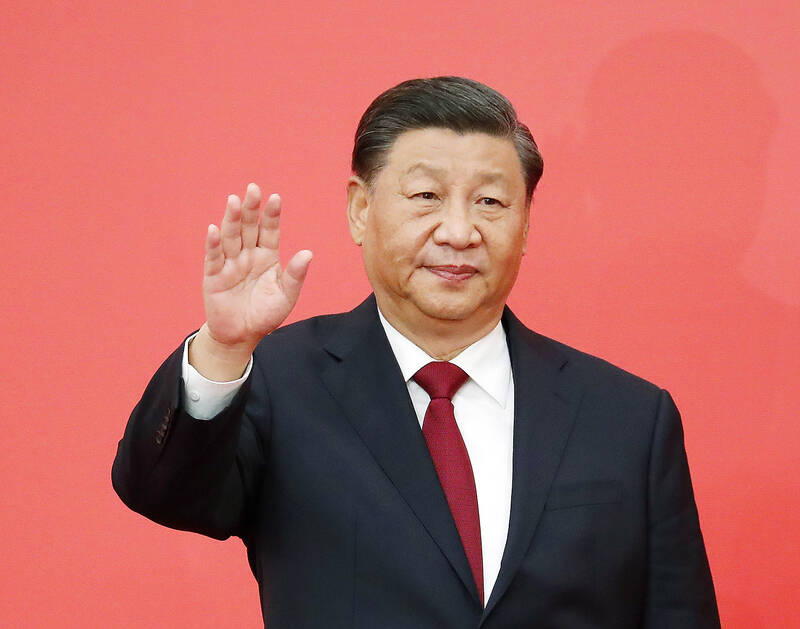Chinese President Xi Jinping (習近平), the country’s most powerful leader in decades, yesterday increased his dominance when he was named to another term as head of the ruling Chinese Communist Party (CCP) in a break with tradition and promoted allies who support his vision of tighter control over society and the struggling economy.
Xi, who took power in 2012, was awarded a third five-year term as general secretary, discarding a custom under which his predecessor left after 10 years.
That has sparked warnings that Xi’s increasingly unchecked power might trigger a succession crisis when his rule finally comes to an end.

Photo: EPA-EFE
Xi’s “reappointment today is the result of his concentration of extreme individual power,” said a senior Chinese political academic who requested anonymity to avoid potential repercussions from the authorities.
The move was “catastrophically negative for the Chinese state,” harming the party’s resilience and heralding “decline and stagnation,” the academic said, adding that it was “inevitable” that Xi, 69, would now seek to rule for life.
The party also named a seven-member Central Politburo Standing Committee, its inner circle of power, dominated by Xi allies after Premier Li Keqiang (李克強), the No. 2 leader and an advocate of market-style reform and private enterprise, was dropped from the leadership on Saturday. That was despite Li being a year younger than the party’s informal retirement age of 68.
“Power will be even more concentrated in the hands of Xi Jinping,” said Jean-Pierre Cabestan, a Chinese politics expert at Hong Kong Baptist University.
The new appointees are “all loyal to Xi,” he said. “There is no counterweight or checks and balances in the system at all.”
Xi and other standing committee members — none of them women — appeared for the first time as a group before reporters in the Great Hall of the People in central Beijing.
The No. 2 leader was Li Qiang (李強), the Shanghai party secretary. That puts Li Qiang in line to become premier, the top economic official. CCP Secretary of the Central Commission for Discipline Inspection Zhao Leji (趙樂際), already a member, was promoted to No. 3, likely to head the legislature.
The lineup appeared to reflect what some commentators called “Maximum Xi,” valuing loyalty over ability. Some new leaders lack national-level experience as vice premier or Cabinet minister that is typically seen as a requirement for the post.
It is the economy that is likely to command Xi’s immediate focus as he embarks on his history-making third term.
His signature “zero COVID-19” strategy, with its snap lockdowns, mass testing and restrictions on movement, has pummeled consumer sentiment and chipped away at growth.
China this week delayed the release of its third-quarter economic growth figures, amid expectations that the country was on course for its weakest performance since the early days of the pandemic in 2020.
The country eked out just 0.4 percent growth in the second quarter, and analysts widely expect it to miss its annual growth target of 5.5 percent by a wide margin.
Additional reporting by AFP

The CIA has a message for Chinese government officials worried about their place in Chinese President Xi Jinping’s (習近平) government: Come work with us. The agency released two Mandarin-language videos on social media on Thursday inviting disgruntled officials to contact the CIA. The recruitment videos posted on YouTube and X racked up more than 5 million views combined in their first day. The outreach comes as CIA Director John Ratcliffe has vowed to boost the agency’s use of intelligence from human sources and its focus on China, which has recently targeted US officials with its own espionage operations. The videos are “aimed at

STEADFAST FRIEND: The bills encourage increased Taiwan-US engagement and address China’s distortion of UN Resolution 2758 to isolate Taiwan internationally The Presidential Office yesterday thanked the US House of Representatives for unanimously passing two Taiwan-related bills highlighting its solid support for Taiwan’s democracy and global participation, and for deepening bilateral relations. One of the bills, the Taiwan Assurance Implementation Act, requires the US Department of State to periodically review its guidelines for engagement with Taiwan, and report to the US Congress on the guidelines and plans to lift self-imposed limitations on US-Taiwan engagement. The other bill is the Taiwan International Solidarity Act, which clarifies that UN Resolution 2758 does not address the issue of the representation of Taiwan or its people in

SHIFT: Taiwan’s better-than-expected first-quarter GDP and signs of weakness in the US have driven global capital back to emerging markets, the central bank head said The central bank yesterday blamed market speculation for the steep rise in the local currency, and urged exporters and financial institutions to stay calm and stop panic sell-offs to avoid hurting their own profitability. The nation’s top monetary policymaker said that it would step in, if necessary, to maintain order and stability in the foreign exchange market. The remarks came as the NT dollar yesterday closed up NT$0.919 to NT$30.145 against the US dollar in Taipei trading, after rising as high as NT$29.59 in intraday trading. The local currency has surged 5.85 percent against the greenback over the past two sessions, central

‘MISGUIDED EDICT’: Two US representatives warned that Somalia’s passport move could result in severe retaliatory consequences and urged it to reverse its decision Minister of Foreign Affairs Lin Chia-lung (林佳龍) has ordered that a special project be launched to counter China’s “legal warfare” distorting UN Resolution 2758, a foreign affairs official said yesterday. Somalia’s Civil Aviation Authority on Wednesday cited UN Resolution 2758 and Mogadishu’s compliance with the “one China” principle as it banned people from entering or transiting in the African nation using Taiwanese passports or other Taiwanese travel documents. The International Air Transport Association’s system shows that Taiwanese passport holders cannot enter Somalia or transit there. The Ministry of Foreign Affairs (MOFA) protested the move and warned Taiwanese against traveling to Somalia or Somaliland